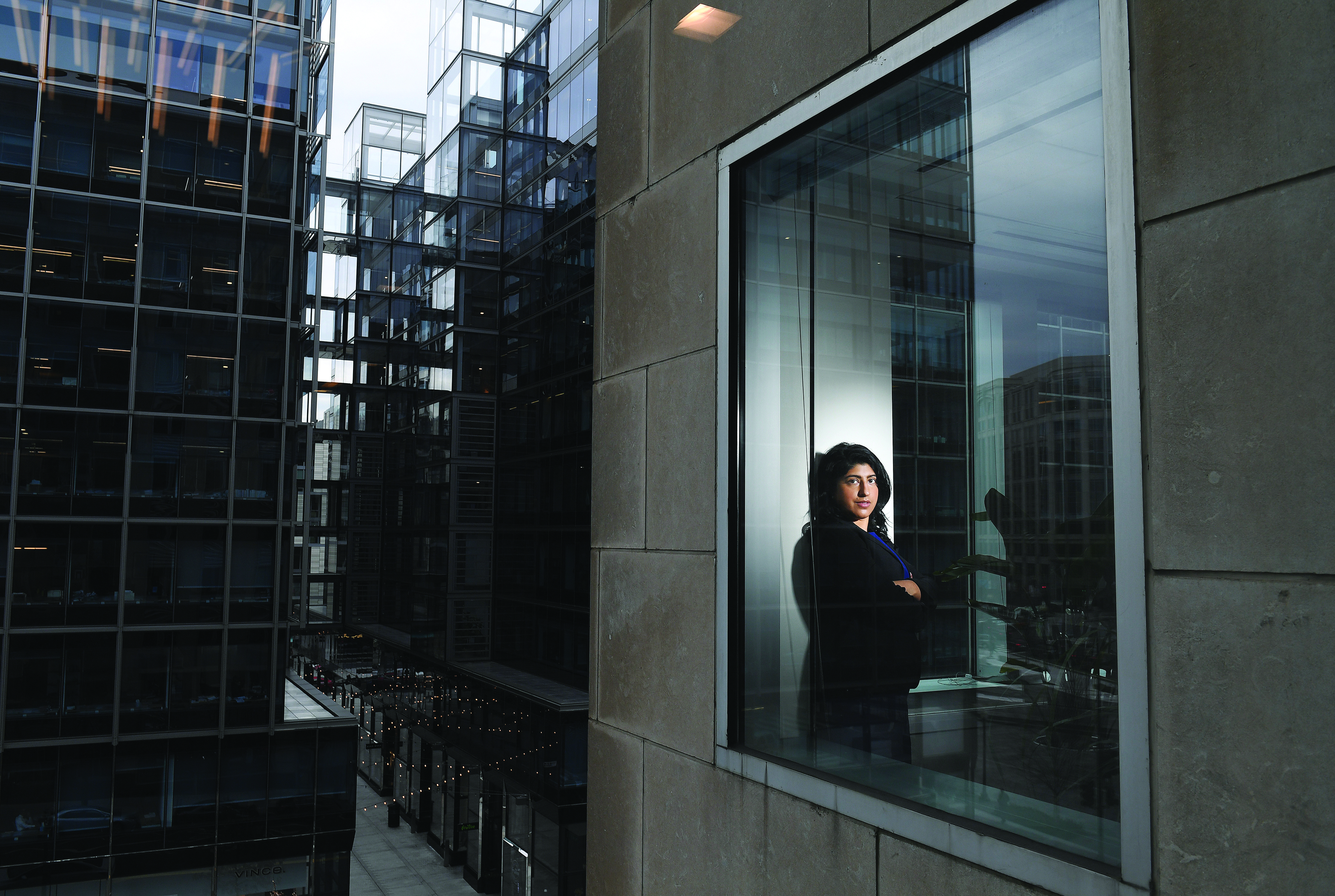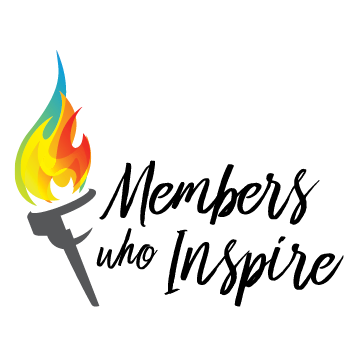Kalpana Kotagal's inclusion riders promote equality in the entertainment industry

Kalpana Kotagal. (Photo by Mitch McClain/The Washington Post via Getty Images)
Nearly seven years ago, Frances McDormand delivered a powerful acceptance speech after winning an Academy Award for her leading role in Three Billboards Outside Ebbing, Missouri.
After urging other female nominees to stand up and reminding the room they all had worthy projects, McDormand said something else: “I have two words to leave with you tonight, ladies and gentlemen: inclusion rider.”
Kalpana Kotagal, a civil rights and employment attorney and a creator of the inclusion rider, had no idea McDormand would mention it. She also didn’t know those two words sent the internet into a frenzy.
“I had gone to sleep,” says Kotagal, who in 2018 was a partner at Cohen Milstein Sellers & Toll in Washington, D.C. “I totally missed Frances McDormand winning the Oscar. I missed her speech. I missed all the craziness that followed that night on social media and Google, with people googling, ‘What is an inclusion rider?’
“I had no idea any of that had happened and woke up the next morning to just, like, chaos.”
Two years earlier, Kotagal worked with Fanshen Cox, then a development executive at Pearl Street Films, and Stacy Smith, founder of the Annenberg Inclusion Initiative at the University of Southern California, to create the inclusion rider. It’s a clause in an actor’s contract that aims to increase the diversity of individuals both on screen and behind the camera.
The inclusion rider relies on the negotiating power of Hollywood A-listers who can demand that a certain percentage of cast and crew be women, people of color, people with disabilities, LGBTQ+ or 40 and older.
Kotagal, who has dedicated her career to supporting workers and championing diversity, equity, inclusion and accessibility, spent the years after McDormand’s speech collaborating with studios, production companies and actors to implement inclusion riders. In 2021, she helped update the inclusion rider template as part of Color of Change’s #ChangeHollywood initiative.
 Actress Francis McDormand’s 2018 Oscar speech was the first time that many people had heard of inclusion riders. (Photo by Chris Pizzello/Invision/AP)
Actress Francis McDormand’s 2018 Oscar speech was the first time that many people had heard of inclusion riders. (Photo by Chris Pizzello/Invision/AP)
Michael B. Jordan is among the actors who pledged to use inclusion riders. Several companies, including AMC Studios, committed to making inclusion riders part of their standard hiring policy. They also were used for the 2022 Grammy Awards and during that year’s New York Fashion Week.
“The more I reflect on it years later, and from the vantage point I have now, I think it is part of this larger movement both in film and television and in other industries to use thoughtful diversity, equity, inclusion and accessibility programs to break down barriers to equal opportunity in the workplace,” says Kotagal, who joined the U.S. Equal Employment Opportunity Commission in 2023.
Fighting for workers
Kotagal’s professional and personal stories are intricately connected.

She grew up in Cincinnati, where her parents settled after coming to the United States from India in the early 1970s. They were part of the wave of immigrants who entered the country after the passage of the Immigration and Nationality Act of 1965, which abolished national origin quotas.
“We have truly lived the American dream,” Kotagal says. “Because of that, because of my family’s story, I feel like I know what’s possible in this country. I understand what could happen for everybody, because my family has been so blessed here.”
“That commitment to equal opportunity is just deeply ingrained in me,” she adds.
Kotagal became a field organizer after graduating from Stanford University with a double major in earth systems and economics in 1999. She started with Green Corps, where she developed grassroots environmental campaigns, and then worked as an assistant national field director for the U.S. Public Interest Research Group.
She had a family friend who represented plaintiffs in class actions and realized she could use her skills to do something similar. “I watched what he did, and I thought, ‘This feels kind of like the lawyer equivalent of organizing,’” Kotagal says. “It is systems work. It builds power. It changes behavior.”
While attending the University of Pennsylvania Carey Law School, Kotagal worked as a summer associate and law clerk at Cohen Milstein. After graduating in 2005 and clerking for Judge Betty Fletcher of the San Francisco-based 9th U.S. Circuit Court of Appeals, she returned to the firm.
During Kotagal’s nearly 17 years with Cohen Milstein, she primarily represented workers in systemic discrimination cases.
“Fighting for workers has obviously been a through line of her entire legal career—she is absolutely dedicated to that,” says Christine Webber, co-chair of Cohen Milstein’s civil rights and employment practice. Webber worked with Kotagal and others at their firm to represent the plaintiffs and a class of more than 1 million female employees in the U.S. Supreme Court case Wal-Mart Stores Inc. v. Dukes.
Kotagal also represented female sales employees alleging discrimination in pay and promotion against Sterling Jewelers. In addition, she represented plaintiffs in a pregnancy discrimination class action; transgender women who sought equitable access to health care; and veterans with disabilities who challenged hiring discrimination at the U.S. Postal Service.
“Just as I carry my family and my family’s story with me, I carry my former clients with me,” Kotagal says. “I saw the way in which discrimination and harassment ripple through their lives, impacting not just their employment, but their families and their futures, their stability and their well-being.”
‘A different perspective’
The U.S. Senate confirmed Kotagal’s nomination to the EEOC in July 2023. Vice President Kamala Harris cast the tiebreaking vote to advance her nomination.
“It felt really special at the time as a fellow South Asian,” says Kotagal, who is the first female commissioner of Indian descent.
In her role with the EEOC, Kotagal helps enforce federal laws that protect workers from discrimination. This includes Title VII of the Civil Rights Act of 1964, which created the commission and makes it illegal to discriminate against a job seeker or employee because of race, color, religion, national origin or sex.
Kotagal also leads the EEOC’s REACH initiative. Its focus is ensuring members of underserved communities know their rights and have access to the commission’s services.
“Being at the commission has given me a chance to continue to work on the issues that I have cared about for a long time as a lawyer,” says Kotagal, whose term ends in July 2027. “I just am doing them from a different perspective now.”
Kotagal lives in Cincinnati with her husband, Wyatt King, and their two sons. She is a longtime member of the ABA Section of Labor and Employment Law and previously served on the board of directors of the nonprofit organizations A Better Balance and Public Justice.
When speaking on panels and at conferences with employers, Kotagal stresses the importance of a continued commitment to lawful and appropriate DEI and accessibility practices.
She considers the inclusion rider part of those efforts and is grateful it opened the doors to a larger conversation.
“Because Hollywood attracts so much attention and people are so excited by it, it allowed us to talk about the way in which many diversity, equity, inclusion and accessibility practices are applicable across a wide range of industries,” she says. “I feel really privileged to be in a place to continue to do that work.”
This story was originally published in the December 2024-January 2025 issue of the ABA Journal under the headline: “Star Power: Kalpana Kotagal’s inclusion riders promote equality in the entertainment industry.”
Members Who Inspire is an ABA Journal series profiling exceptional ABA members. If you know members who do unique and important work, you can nominate them for this series by emailing [email protected].
Write a letter to the editor, share a story tip or update, or report an error.


